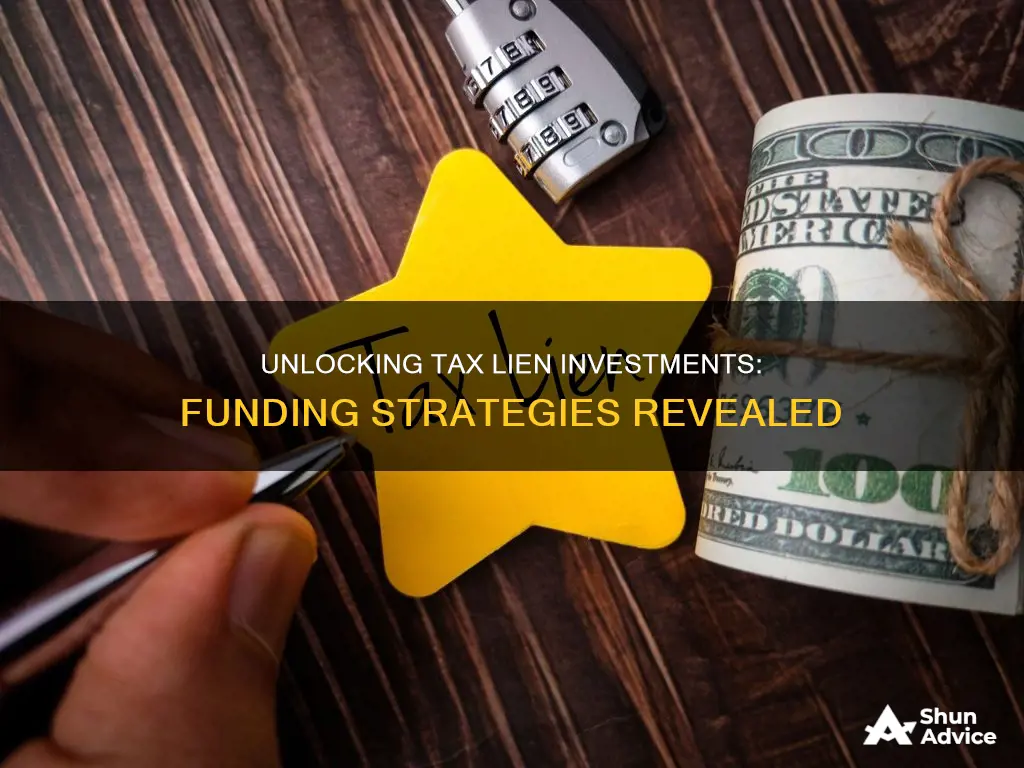
Tax lien investing is an accessible option for individuals looking to diversify their investment portfolios. Tax liens are placed on individuals or businesses that fail to pay property taxes. You can purchase tax lien certificates at public auctions and may be rewarded with interest payments as property owners repay the debt over time. However, tax lien investments can be risky as some homeowners may be unable to repay their debts or file for bankruptcy. Before investing, it is important to conduct thorough research and understand the local laws and regulations surrounding tax liens.
| Characteristics | Values |
|---|---|
| What is a tax lien? | A legal claim on a property to collect unpaid taxes, including any accumulated interest. |
| Who places a tax lien? | A local government, typically the city or county where the property is located. |
| What is a tax lien certificate? | A document detailing how much the property owner owes in unpaid taxes, interest, and penalties. |
| Who issues a tax lien certificate? | The local government. |
| Who can buy a tax lien certificate? | Investors, who purchase them at auctions. |
| What is the process for buying a tax lien certificate? | Investors bid on the certificates at auction, either based on a fixed cash amount or an interest rate. The highest bidder in the case of a cash offer or the lowest bidder in the case of an interest rate wins. |
| What happens after an investor buys a tax lien certificate? | The investor takes control of the certificate and has the right to collect the unpaid taxes, interest, and penalties from the property owner. If the taxes remain unpaid, the investor may be able to take ownership of the property through foreclosure. |
| What are the potential outcomes of investing in a tax lien certificate? | There are two potential outcomes: the homeowner pays their overdue property taxes or they don't. If the homeowner pays, the investor makes back their initial investment plus interest. If the homeowner doesn't pay, the investor can initiate foreclosure proceedings. |
| What are the risks of investing in tax liens? | Tax lien investing can be risky as there is a chance that homeowners may be unable to repay their debts or file for bankruptcy. It requires a lot of time, upfront research, and knowledge of the foreclosure process. There may also be other liens on the property that can impact the investor's ability to take ownership. |
| What are the benefits of investing in tax liens? | Tax lien investing can provide exposure to real estate without actually owning property. It can also offer a generous return on investment, with interest rates ranging from 3% to 18% depending on the jurisdiction. |
| How much does it cost to invest in tax liens? | Investors can start with as little as a few hundred dollars, but the majority of tax lien certificates cost much more. |
| Are there any alternative ways to invest in tax liens? | Yes, investors can consider investing passively through an institutional investor or a tax lien investment fund. |
What You'll Learn

How to bid on tax lien certificates
Bidding on a tax lien certificate is a complicated process that requires thorough research and familiarity with the local area. Here is a step-by-step guide on how to bid on tax lien certificates:
- Familiarize yourself with the local area: Contact tax officials in your area to understand how delinquent taxes are collected.
- Decide on the type of property you want to bid on: Residential, commercial, undeveloped land, or property with improvements.
- Find out when and where the auction will be held: This information is usually available from the city or county treasurer's office.
- Conduct due diligence on the properties: Research the properties up for auction, including the property's value, condition, payment requirements, deadlines, and the foreclosure process.
- Register for the auction: Bidders usually need to register and provide a deposit before participating in the auction.
- Bid on the tax lien certificates: Bids can be based on the highest cash amount, the lowest interest rate, or another method. Be aware of the competition from commercial institutions and the potential for bidding wars.
- Pay the balance if you win the bid: The winning bidder is responsible for paying the entire tax bill, including delinquent debt, interest, and penalties.
- Handle foreclosure proceedings if necessary: If the property owner does not repay the debt, the winning bidder may need to initiate foreclosure proceedings to take ownership of the property.
Remember that tax lien investing is a risky and complicated process, and it is important to understand the rules and potential pitfalls before participating in an auction.
Maximizing Your HSA Funds: Smart Investment Strategies
You may want to see also

How to pay for tax lien certificates
Tax lien certificates are generally purchased through auctions, which can be held online or in person. The process of buying a tax lien certificate is similar to that of buying a property at an auction. However, there are some key differences and considerations to keep in mind when paying for tax lien certificates. Here are the steps to follow:
- Decide on the Type of Property: The first step is to determine the type of property you want to bid on. This could be residential, commercial, undeveloped land, or property with improvements. It's important to consider your level of expertise and comfort in managing different types of properties.
- Contact the Local Tax Revenue Office: Reach out to your local tax revenue office to gather information about upcoming tax lien auctions. They will provide details on auction dates, locations, and requirements for participation.
- Research the Properties: Before the auction, conduct thorough research on each property you're interested in. This includes assessing the property's value, condition, payment requirements, and deadlines. It's crucial to have a good understanding of the foreclosure process as well.
- Register and Provide a Deposit: Auctions typically require bidders to register in advance and provide a deposit. Make sure you understand the accepted methods of payment and any other pertinent rules for the auction.
- Bid on the Tax Lien Certificates: During the auction, investors bid on the tax lien certificates by offering to pay the unpaid taxes, plus any interest and fees. The auction process can vary, with bids based on the highest cash amount, the lowest interest rate, or other methods.
- Pay the Amount and Take Ownership: If you are the winning bidder, you will need to pay the full amount of the tax lien certificate within a short period, usually one to three days. At this point, you will take ownership of the tax lien certificate and have the right to collect the unpaid taxes from the property owner.
It's important to note that tax lien investing carries certain risks and complexities. Conduct thorough due diligence, understand the local real estate market, and be aware of the potential for unforeseen expenses and legal hurdles.
Why Investment Funds Need Broker-Dealers: A Strategic Partnership
You may want to see also

How to collect on tax lien certificates
Tax lien investing is an indirect form of real estate investing. Rather than buying properties, investors buy tax lien certificates and try to collect interest on a property owner's unpaid taxes.
Here's how you can collect on tax lien certificates:
- Understand the process: Before investing, it's important to understand what a tax lien is and how tax lien investing works. A tax lien is a legal claim on a property, placed by a local government, to collect unpaid property taxes from a homeowner. The local government issues a tax lien certificate detailing how much the property owner owes. If the taxes remain unpaid, the certificate can be auctioned off to investors.
- Check state laws: The sale of tax lien certificates to investors is not available in all states. So, before investing, check if it's allowed in your state.
- Research the property: It's crucial to research the property you're interested in bidding on. Know the property's value, condition, payment requirements, and deadlines. Also, familiarize yourself with the foreclosure process as you may need to initiate it if the homeowner fails to pay their taxes.
- Bid on the tax lien certificate: Participate in the auction, which can be held in-person or online, and bid on the tax lien certificate. Bids can be based on a fixed cash amount or an interest rate. The certificate goes to the highest bidder in the case of cash offers, and to the lowest bidder in the case of interest rates.
- Take control of the tax lien certificate: As the winning bidder, you'll take ownership of the tax lien certificate. This gives you the right to collect when the homeowner repays their overdue tax bill. If the homeowner fails to repay, you may be able to take ownership of the property through foreclosure.
- Pay the amount of taxes owed: When you win a tax lien auction, you become responsible for paying the tax bill, including any interest or fees. The homeowner then has a certain amount of time, known as the redemption period, to repay their unpaid property taxes before the deadline.
- Initiate foreclosure if necessary: If the homeowner fails to repay their overdue property taxes, you can start the preforeclosure process. Depending on the state, you may need to initiate foreclosure within a certain timeframe after buying the tax lien. Keep in mind that it's quite rare for the situation to get to this point, as most homeowners pay their tax bills before the foreclosure process begins.
Remember that tax lien investing can be tricky and requires a lot of time, upfront research, and a solid understanding of the foreclosure process. Make sure to carefully consider the risks involved before investing in tax liens.
Warren Buffett's Stance on Index Funds Explained
You may want to see also

How to foreclose on a property
Foreclosing on a property is a complex process that varies depending on the jurisdiction. Here is a general step-by-step guide on how to foreclose on a property:
- Understand the Local Laws: Foreclosure processes and regulations differ based on location. Familiarize yourself with the specific laws, rules, and procedures applicable in your state or country.
- Identify Delinquent Taxpayers: Identify property owners who have failed to pay their property taxes or other tax liabilities. You can obtain this information from public records or by contacting the relevant government authorities.
- Place a Lien on the Property: Work with the local or municipal government to place a lien on the delinquent taxpayer's property. This involves creating and issuing a tax lien certificate, which details the taxes owed, including any interest and penalties.
- Notify the Property Owner: Send a demand letter to the property owner, informing them of the delinquent taxes and the consequences of non-payment, which may include foreclosure.
- Auction the Tax Lien Certificate: If the property owner fails to pay the taxes, the government may auction the tax lien certificate to private investors. Investors bid on these certificates, seeking the right to collect the delinquent taxes, interest, and penalties from the property owner.
- Initiate Foreclosure Proceedings: If the investor wins the auction and the property owner still fails to pay the taxes within the specified redemption period, the investor can initiate foreclosure proceedings. This involves filing a complaint with the appropriate court and following the legal process to obtain a judgment of foreclosure.
- Conduct a Foreclosure Sale: If the court grants a judgment of foreclosure, the property will be sold at a public auction or through another approved process. The proceeds from the sale are used to satisfy the tax lien, with any remaining balance going to the property owner or other lienholders.
- Transfer Property Ownership: Once the foreclosure sale is complete, the new owner will receive the deed to the property and full ownership rights.
It is important to note that the specific steps and requirements may vary based on your location, so be sure to consult with legal professionals and refer to local laws when initiating foreclosure proceedings.
Fixed Income Funds: A Smart, Safe Investment Choice
You may want to see also

How to avoid common pitfalls
- Do your research: Tax lien investing requires a a lot of upfront work and due diligence. Familiarise yourself with the local area and the specific property you're bidding on. Check for other liens on the property, as these may impact your ability to claim it. Research the property's value and condition, payment requirements and deadlines, and the foreclosure process.
- Be aware of the risks: Tax lien investing is a relatively risky business and is generally not appropriate for investors who are inexperienced or lack knowledge of real estate.
- Understand the process: Before diving into tax lien investing, make sure you understand what a tax lien is and how the process works. Check if the sale of tax lien certificates to investors is allowed in your state, as this varies.
- Be mindful of expiration dates: Tax liens have an expiration date, after which the lienholder loses the right to collect any unpaid balance. Keep on top of deadlines and be prepared to initiate foreclosure proceedings if necessary.
- Watch out for bidding wars: Bidding wars can drive down interest rates and profit potential. Keep in mind that as interest rates fall, so do profits.
- Consider investing passively: Due to the amount of research and expertise involved, it may be worth considering investing passively through an institutional investor who is a member of the National Tax Lien Association (NTLA).
Mutual Funds and 401(k)s: A Dynamic Retirement Savings Duo
You may want to see also
Frequently asked questions
A tax lien is a legal claim on a property to collect unpaid taxes, including any accumulated interest. A local government, typically the city or county where the property is located, places a tax lien on a property when a homeowner fails to pay their property taxes.
You can get funding to invest in tax liens by purchasing tax lien certificates at public auctions. You can also invest through tax lien investment funds.
Investing in tax liens can be risky as some homeowners may be unable to repay their debts or file for bankruptcy. It is also important to do your due diligence and research the properties and local laws before investing.







